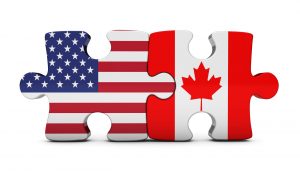Advantages to businesses on both sides of the border go beyond trade agreement’s cost savings
This article was originally published in Global Trade Magazine on Sept. 20, 2018
 By Cora Di Pietro, Vice President, Consulting, Livingston International
By Cora Di Pietro, Vice President, Consulting, Livingston International
Given recent headlines around the fate of the North American Free Trade Agreement (NAFTA), it’s understandable why some observers might believe the sky will be falling quite imminently.
Threats of Canada being excluded from what has essentially been a bilateral pact concluded in principle between the United States and Mexico could lead one to conclude that historically viable, cost-effective, continental supply chains are now at risk of obsolescence. Factories and distribution centers will be mothballed and billions in past investments will be vanquished with the stroke of a pen.
This doomsday picture presumes the worst-case scenario, namely that members of Congress will passively rubberstamp a bilateral US-Mexico agreement without regard for the protestations of the business community, labor groups and their very constituents. While such a scenario isn’t impossible it is highly improbable.
But let’s assume for a moment that such a scenario were to be realized; that Washington would exclude Canada from its long list of free trade partners. What would the outcome be and who would suffer most?
Certainly, the impact would be felt on both sides of the 49th parallel. US businesses that had previously enjoyed the liberty of being able to transport goods across the Canadian border without tariffs or duties would then face increased landed costs. In some cases, this might negate the value proposition associated with sourcing goods from Canada and/or selling wares in the Canadian market.
For many businesses, however, the most likely outcome of Canada being excluded from free trade with the US would be simply business as usual.
The reality is that Canada and the US are each other’s most valuable trade partners and abolition of free trade between them won’t change that.